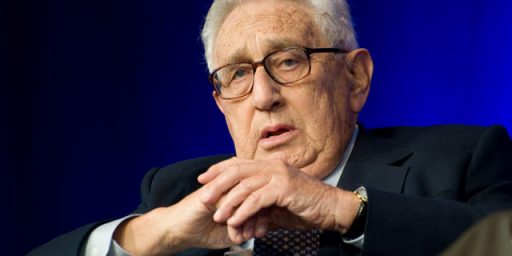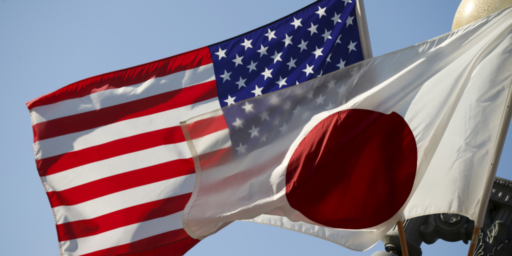Kissinger: Containment Won’t Work for China
Former Secretary of State and National Security Advisor Henry Kissinger, who coauthored the opening of relations with China in 1972, argues that Soviet-style containment policy will not deter China. Further, he argues that it is not necessary.
China: Containment Won’t Work (WaPo, Jun 13, A19)
[…] The rise of China — and of Asia — will, over the next decades, bring about a substantial reordering of the international system. The center of gravity of world affairs is shifting from the Atlantic, where it was lodged for the past three centuries, to the Pacific. The most rapidly developing countries are in Asia, with a growing means to vindicate their perception of the national interest.
China’s emerging role is often compared to that of imperial Germany at the beginning of the 20th century, the implication being that a strategic confrontation is inevitable and that the United States had best prepare for it. That assumption is as dangerous as it is wrong. The European system of the 19th century assumed that its major powers would, in the end, vindicate their interests by force. Each nation thought that a war would be short and that, at its end, its strategic position would have improved. Only the reckless could make such calculations in a globalized world of nuclear weapons. War between major powers would be a catastrophe for all participants; there would be no winners; the task of reconstruction would dwarf the causes of the conflict. Which leader who entered World War I so insouciantly in 1914 would not have recoiled had he been able to imagine the world at its end in 1918?
[…]
Military imperialism is not the Chinese style. Clausewitz, the leading Western strategic theoretician, addresses the preparation and conduct of a central battle. Sun Tzu, his Chinese counterpart, focuses on the psychological weakening of the adversary. China seeks its objectives by careful study, patience and the accumulation of nuances — only rarely does China risk a winner-take-all showdown.
[…]
The strategic equation in Asia is altogether different. U.S. policy in Asia must not mesmerize itself with the Chinese military buildup. There is no doubt that China is increasing its military forces, which were neglected during the first phase of its economic reform. But even at its highest estimate, the Chinese military budget is less than 20 percent of America’s; it is barely, if at all, ahead of that of Japan and, of course, much less than the combined military budgets of Japan, India and Russia, all bordering China — not to speak of Taiwan’s military modernization supported by American decisions made in 2001. Russia and India possess nuclear weapons. In a crisis threatening its survival, Japan could quickly acquire them and might do so formally if the North Korean nuclear problem is not solved. When China affirms its cooperative intentions and denies a military challenge, it expresses less a preference than the strategic realities. The challenge China poses for the medium-term future will, in all likelihood, be political and economic, not military.
While I’m less convinced of China’s victimhood and more worried about its military buildup than Kissinger, he’s ultimately right. While the Chinese leadership is maddening to deal with, they are rational actors. They’re decades away from being a peer competitor with the United States and are painfully aware of that fact. Further, their ambitions are regional rather than global.
Update: David Adesnik finds Kissinger’s essay “rambling” and demonstrating “all of the flaws of realism as an ideology.”
Someone (maybe someone from Tibet) should’ve told that guy standing in front of the tank in Tiananmen Square that China is governed by “substantial force” only “in the background”. Apparently, Mr. Kissinger seems to have forgotten that China is still a dictatorship. In fact the word ‘dictatorship’ doesn’t appear in his op-ed. Nor does ‘democracy’. Nor does ‘human rights’.
Of course, Kissinger would be proud of that, arguing that a country’s internal politics has little to do with the external interests that govern its foreign policy.
Jim Henley takes a different tack on the piece, arguing that the United States could learn from China’s foreign policy.






I blogged about that Kissinger article a couple days ago, noting that “China is building economic hegemony, not a military empire”. Our task is to support their trend towards global economic competitiveness — which, hopefully, will lead them to social and economic liberalization — while dissuading them from more isolationist/mercantilist economic policies. And we have to do that without being antagonistic.
It’s a tough nut to crack.
There’s certainly an influential element withint the US government, and the policy circle that are hyping the China threat. What is their motivation? Are they looking to use the Taiwan and trade issues to do something with China? Just look at that big ad on the left for Bill Gertz’s book. Now there’s a man with a fixation on China, since most of his career’s been built on leaks about the Chinese threat and hyping it up for what purpose I’m not sure.
There is no security threat in the world. The U.S. is just hell-bent on expanding the Empire and plundering the world’s resources. It’s all part of the Neo-Con master plan….
Poor Communists, they just want to live in peace. Why do we have to bother them with threats and labels, we all know who the REAL opressors are!
DC Loser:
“Hyping” the China threat? China’s methods and intentions can be debated but to ignore a 1.3 billion person country that is steadily growing in both economic and military clout seems more in the area of wishful thinking. As Kissinger indicates, the Chinese are rational but that does not mean that they weigh or perceive things the same as the average person who has lived in the US or Europe most of their lives. I worked in China for many years and maintain many contacts (both Chinese and foreigner) who are still resident in the country and it is quite obvious that trying to predict the actions of China is very difficult for a variety of reasons (educational nationalism, perceived place in the world – the Middle Kingdom concept, fairly authoritarian government, disjointed control between the national and provincial governments, etc.). As an example, the standard printed map in China has their national boundary running along the coast of Vietnam to just above Borneo and the west of the Philippines – most of the South China Sea is definitely stated as within their national boundary (no debate) – I believe they are currently in boundary disputes with every neighboring country. In many cases, one would be wrong in thinking what I would do in a specific case and transposing that on the Chinese leadership or many of their citizens. Given this situation, it is better to proceed with our eyes open and prepare for a worst case scenario while hoping for the best.
I’d be more worried if we didn’t have people apparently “hyping” the potential threat posed to this nation by a country that outnumbers us by a billion people and has, at least nominally, a political ideology inimical to what our nation stands for. Add to that the cultural barriers freedebate mentions, and it would be suicidal not to have somebody focusing on China.
McGehee,
The CCP’s political ideology is inimical to what its own economic reality is. I’m not saying don’t focus on China. We must of course plan for any eventuality, but my point is that there are people pushing for an active US policy of antagonism towards China that is what Kissinger is inferring in his piece.
You know that, and I know that — and we both have our ideas how that would best be reconciled, which despite our political differences have much more in common with each other than with what the CCP’s ideas probably are.
As for antagonism, China is by no means innocent for its own part on that score.
Well , first of all china is not a threat in today’s world. Look all around in the world in every region there is only us/europe involved in every one of them. How can you can call china antagonistic when the so called average person’s country is in every conflict in the world. Now, as china’s clout grows economically and militarily, is she going to flex her muscles in the future? well which superpower wouldn’t. Why will you blame china alone when america and every other super power before did. well, in the future IF india becomes a superpower i expect her to do the same. why does west have the right in this world that the east doesn’t seem to have. Why isit bad if anyone from anywhere other than the west becomes powerful. Afterall, the east has a much longer heritage and prudence than the west. I am not sure but Mr.Kissinger’s comments (when he was National Security Advisor )during the Indo / Pak war of 1971 was just declassified and in that he used profanities against india and openly supported a dictatorship in pakistan and urged china to threaten india by moving its military forces against india. China with all its superior prudence decided against it. Now we are questioning china on why they are building their military ? Try to see our actions from an outsider’s perspective and guess what the next superpower will do ?